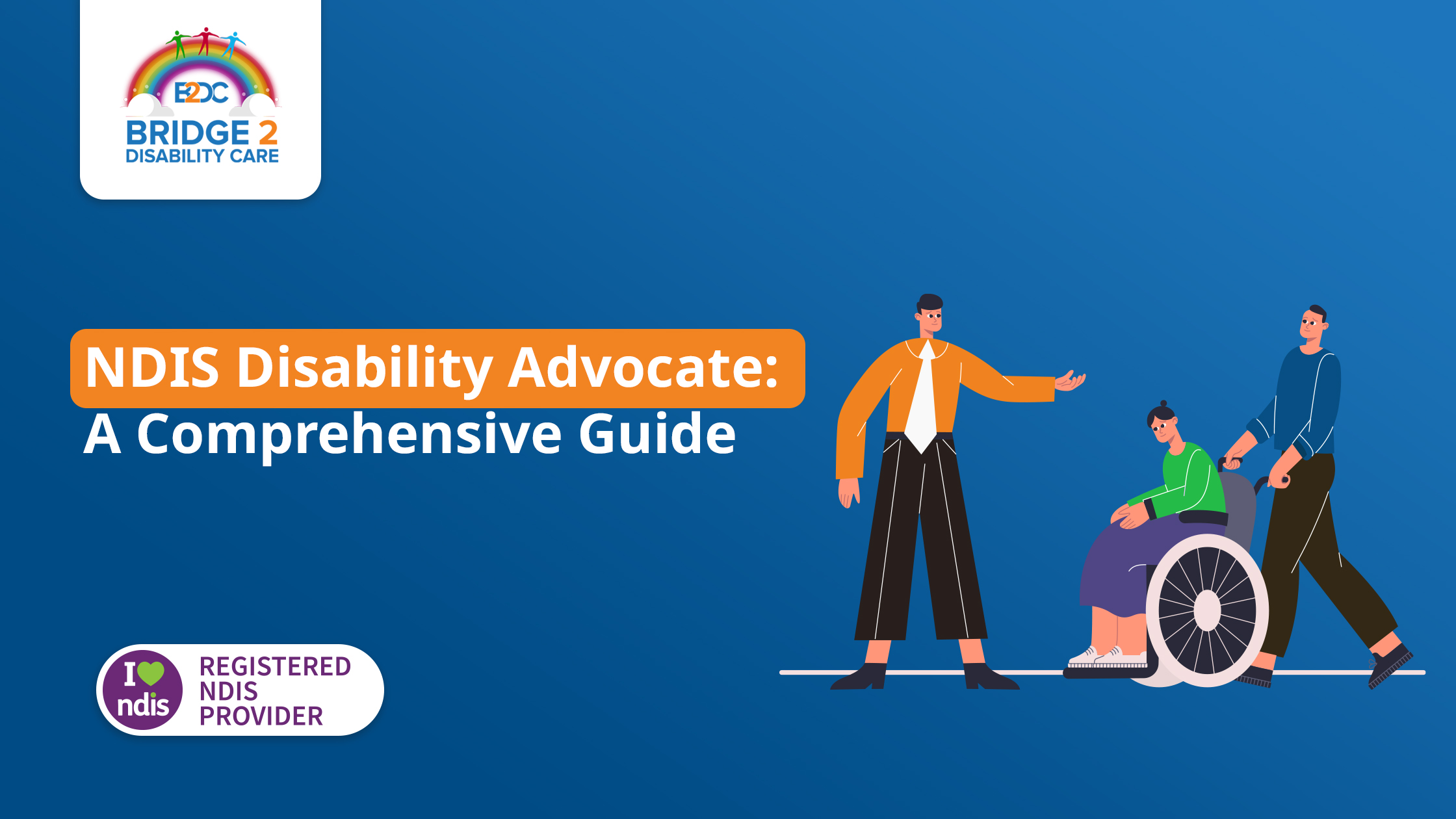Even though the NDIS strives to offer individuals with disabilities greater autonomy and authority, within the intricate landscape of disability support services, advocacy stands tall as a beacon of empowerment and protection.
There could be moments in your life when you require assistance in safeguarding and upholding your rights. This is where the aid of a disability advocate becomes invaluable.
At Bridge 2 Disability Care, we believe in championing the rights and voices of individuals, ensuring they receive the support and services they need to thrive.
In this article, we delve into the invaluable role of Advocacy in the National Disability Insurance Scheme (NDIS) journey.
What is Disability Advocacy?
Disability advocacy supports and defends the rights of people with disabilities. A disability advocate can assist individuals or groups facing challenges that affect their rights and equality.
Types of Advocacy –
Self-advocacy: When a person with a disability speaks up for themselves. They can get support and training from community groups.
Individual advocacy: An individual helps another person with a disability on a personal level. This could be a professional advocate, a family member, a friend, or a volunteer.
Group/family advocacy: When someone advocates for a group of people with disability, like those living together in shared housing.
Citizen advocacy: Community volunteers support and advocate for a person with a disability, with help from a citizen advocacy organization.
Systemic advocacy: Working to change laws, policies, and practices over time to better serve the rights and interests of people with disabilities.
Legal advocacy: When a lawyer represents a person with a disability in legal matters, works to change laws, or provides legal advice on discrimination and human rights.
*Advocates may be paid or operate on a voluntary basis.
The National Disability Insurance Scheme Act 2013 acknowledges the crucial role of advocates, including independent ones, in assisting individuals with disabilities.
The Act mandates NDIS-registered providers to collaborate with advocates and arrange for independent support for individuals with disabilities who seek it during complaints or incidents.
Characteristics of a quality disability advocate include:
- Advocates have no bias and prioritize your best interests.
- They provide support and may advocate on your behalf when needed.
- Advocates focus on addressing your specific needs.
- They remain loyal to you while also respecting the rights of others.
- Advocates serve as your voice when necessary.
Roles and Responsibilities of a Disability Advocate
By understanding the roles and responsibilities of an advocate you can better understand how they can assist you.
There are several things a disability advocate can assist with, including:
- Giving information to people with disabilities about their rights and finding cases of unfair treatment.
- Helping people with disabilities stand up for their rights by talking to people and organisation to solve problems.
- Assisting people with disabilities in dealing with complaints or legal matters to protect their rights.
- Writing letters and lobbying the government to make changes that support the rights of people with disabilities.
- Campaigning for social change by speaking to the media to raise awareness and highlight situations where people with disability are treated unfairly
It is important to note that while disability advocates can provide incredible support, they are not:
- Counsellors
- Able to make decisions for another person
- Mediators
- Case managers
When Do You Need a Disability Advocate in the NDIS?
Knowing when to involve a disability advocate with the NDIS depends on your situation. Some people can handle it alone, while others need more help due to their disability, lack of family support, or difficulty communicating. Here are some situations where getting help from a disability advocate can be useful:
Limited Understanding of the NDIS
If you don’t understand the NDIS well, an advocate can make things clearer and help you understand what you can do.
Complex or Multiple Disabilities
If you have complex disabilities, an advocate who knows about different needs can offer specialized support.
Conflict with the NDIS
When you have disagreements with the NDIS about money, plans, or services, an advocate can help resolve these conflicts.
Limited Informal Support
If you don’t have much support from family or friends, an advocate can guide and support you.
Time Constraints and Stress
Navigating the NDIS can be stressful and time-consuming. An advocate can ease this burden during reviews and appeals.
Maximising NDIS Benefits
An advocate can help you find and make the most of NDIS supports and services that you’re entitled to.
Ways to find a Disability Advocate:
There are many ways to find a disability advocate, including:
- Ask Around: Talk to your friends or family and see if they know of any good disability advocates. Recommendations from people you trust are valuable.
- Join Groups or Forums: On social media platforms like Facebook, there are groups dedicated to disability advocacy. You can search for these groups and join them to get recommendations.
- Online Search: Use search engines like Google to find disability advocates. Just type in “disability advocate” along with your location, and you’ll find many options to choose from.
- Use the Disability Advocacy Finder Tool: You can Find an Advocate using the Disability Advocacy Finder. You can use it to search for advocates by entering your postcode or state. Then, you’ll get a list of options to explore.
People with disability have often faced abuse, prejudice, and a lack of support. Despite progress, barriers still exist. Disability advocates are essential for ensuring equal rights and opportunities.
A disability advocate can guide you through your NDIS journey, from eligibility to reviews and appeals. Their expertise and empathy offer comfort and support.
For any questions about your NDIS plan, feel free to contact our team. We’re here to help with any inquiries you may have.
Call Us at 08 6119 9696
Email us at info@disabilityserviceswa.com.au

